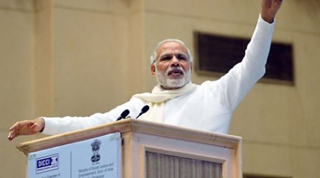
On the lines of the Centre’s Stand Up India programme, the state is set to come up with a comprehensive policy to facilitate and promote entrepreneurship among Maharashtra’s scheduled caste (SC) and scheduled tribe (ST) communities.
The decision comes ahead of Prime Minister Narendra Modi’s formal inauguration of the Stand Up India scheme on April 6.
To work on the proposal, the state has roped in the services of Dalit Indian Chambers of Commerce of Industries (DICCI) chairman Milind Kamble.
The policy entails strengthening the network between the state, DICCI and banking sectors, to ensure each bank helps at least two dalits, including one woman, to promote entrepreneurship. At present, there are 27 public sector banks with 1.25 lakh branches across the country. Every bank extending loans to two candidates would mean 2.5 lakh entrepreneurs a year.
The SC population in the state accounts for 11.8 per cent and STs 9.4 per cent. Although DICCI, with more than 5 lakh members, has a list of 100 dalit entrepreneurs with annual turn-overs of Rs 100 crore, the overall entrepreneurship is 15 per cent in the state, at par with the all-India statistics.
“The per capita income in the state is Rs 1.5 lakh, which is very satisfactory. However, the persistent concern is whether the income of dalits and tribals matches this figure. If 30 per cent people are employed on daily wages under NREGA, it shows an economic mismatch,” said Chief Minister Devendra Fadnavis. The Stand Up Maharashtra policy is a step towards removing this disparity, Fadnavis said, reiterating his governnment’s commitment to Ambedkar’s economic policies.
According to DICCI chairman Milind Kamble, “Stand up Maharshtra, on the lines of Stand UP India, will be a success model, as it mandates extending financial guarantee to cover up loan risk, thus enhancing the credit cover to SC/ST entrepreneurs.”
Drawing a distinction from Start Up India, which is based on innovations and thus involves a greater risk factor, Kamble said Stand Up India comes under green field projects.
The role of DICCI would be to identify the potential SC/ST entrepreneur and work closely with banks to access loans under the scheme. Another aspect of the scheme involves upliftment of dalit and tribal women. The percentage of dalit women entrepreneurship is extremely poor both at national and state level, despite them accounting for 50 per cent of the population.
The union ministry of social justice secretary Anita Agnihotri said, “For the first time, the ministry of social justice along with the ministry of small and medium industries and finances is proactively working for the economic empowerment of SC/ST women.”